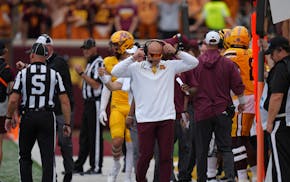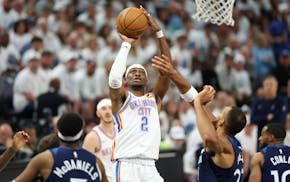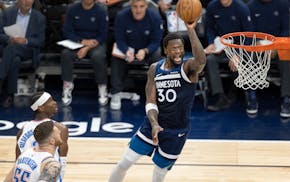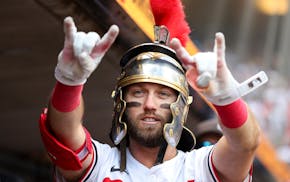The NHL announced in 1997 that it would be returning to Minnesota with an expansion team to be located in a new arena in St. Paul. The expansion fee for the team starting in the fall of 2000 was $80 million.
Two decades later, Las Vegas joined the NHL after paying a $500 million expansion fee and Seattle followed by paying $650 million, putting the total number of teams at 32.
On the surface, it would seem that the Wild received a bargain price for entry, but remember:
When Bob Naegele and Co. agreed to that sum, the entire nation of Canada — where hockey was king — and anyone in New England, or here in Minnesota, Wisconsin or North Dakota, were howling with laughter at what U.S. television had introduced to the fastest game on ice.
The NHL's desperate attempt for a major national outlet had taken it to Fox Sports in 1994, which made the deal with one major reservation:
David Hill, the head of that operation at the time, felt that many viewers could not follow the puck. Thus, at the 1996 NHL All-Star Game, a glowing puck — titled "FoxTrax" — was introduced to the U.S. audience.
There were sensors in the pucks used for Fox games, generating a blue glow that was absolutely hilarious to view.
The blue-light puck was last used in the first game of the Stanley Cup Finals in 1998. A four-game sweep by Detroit over Washington prevented its usage, which was scheduled for Games 5 and 7, and thus ended the glowing puck.
When you think of that TV slapstick to make the game digestible for vast areas of the country, and see the national attraction that the NHL has become, Commissioner Gary Bettman should be receiving roaring cheers rather than boos when he shows up in arenas.
Can you imagine the envy that must be felt in the NBA offices when you consider this: the NHL has Seattle, which the NBA allowed itself to lose for Oklahoma City; the NHL has Las Vegas, where the NBA has "Summer League"; and way back in the fall of 1998, a few months after the death of "FoxTrax," the Predators started playing in Nashville.
That has become the liveliest city in the South, while the NBA has Memphis (rather than Vancouver) and poor, suffering New Orleans.
The NBA is planning ultra-expensive expansion teams for Las Vegas and Seattle, but those will not dislodge the firm footholds Bettman and the NHL have claimed with the Golden Knights and the Kraken.
What we have seen over the last two weeks — ongoing with the Timberwolves, ended unhappily with the Wild — is two sports at their zenith when offering springtime playoff competition. The skills are incredible, and what athletes find in themselves can be difficult to comprehend.
The Wild went out for the eighth consecutive time in the first round, although this was not as meekly as in several of those early series.
They actually had seized Game 5 in remarkable fashion on a splendid goal by Ryan Hartman, until replay showed Gustav Nyquist drifting offside by a half-foot when there was no reason to do so.
The reports from Vegas were that Nyquist's teammates showed support for him. When reading such things, I'm reminded of a long-ago high school basketball coach who lost a trip to the state tournament because "Charlie" fired up a shot the team had been told firmly not to take in the final seconds.
Assistant: "Coach, Charlie is in the locker room crying."
Upset coach: "He better keep crying. If he stops crying, he's going to have to walk home."
Support? Coach John Hynes should have told Nyquist to fly home on a different plane.
As for Thursday night's 3-2 Vegas win, there was a trip and then a tackle from Noah Hanifin that went uncalled as the visitors held on to the one-goal lead in the final minutes, allowing Wild fans to follow our tradition of complaining about the refs after defeats.
As for the Timberwolves, they have gone into the second round — and did so in a decisive Game 5 that featured exceptional defense and pounding the boards to offset dreadful shooting.
The pre-series concerns that LeBron James and Luka Doncic would get all the calls because the NBA wanted the Lakers to win were revealed to be needless paranoia for the T-Wolves faithful.
What is amazing about these past two weeks of gut-wrenching playoffs is this:
Basketball and hockey remain the major sports that couldn't be more different, with a real scoring opportunity occurring every 15 seconds in hoops and perhaps every five minutes in hockey, with 50-plus fouls and another 50 ignored in hoops, and seven penalties called and dozens ignored in pucks …
And yet, the over-the-top emotion the athletes bring to the competition and to their fan bases in springtime are identical.
Which makes both dang outstanding, I'd say.

Reusse: Murphy's return will be a fun time on the ice

Reusse: Gophers vs. Huskers and an 80th birthday on a fall Friday? Good day to be a homer again

Reusse: Bring on boos, but Gilgeous-Alexander is a deserving MVP

Reusse: A closer study of the Wolves at their absolute best reveals the value of Randle


